Influences of Globalisation on Organisational Leadership and Sustainable Ethical Globalisation
VerifiedAdded on 2023/06/10
|18
|3765
|386
AI Summary
This report discusses the influences of globalisation on organisational leadership, government culture structure and functions, sustainable and ethical globalisation, and different methods of decision making in a global context. The report is based on Sasol Company, a global organisation in the energy and chemical industry.
Contribute Materials
Your contribution can guide someone’s learning journey. Share your
documents today.
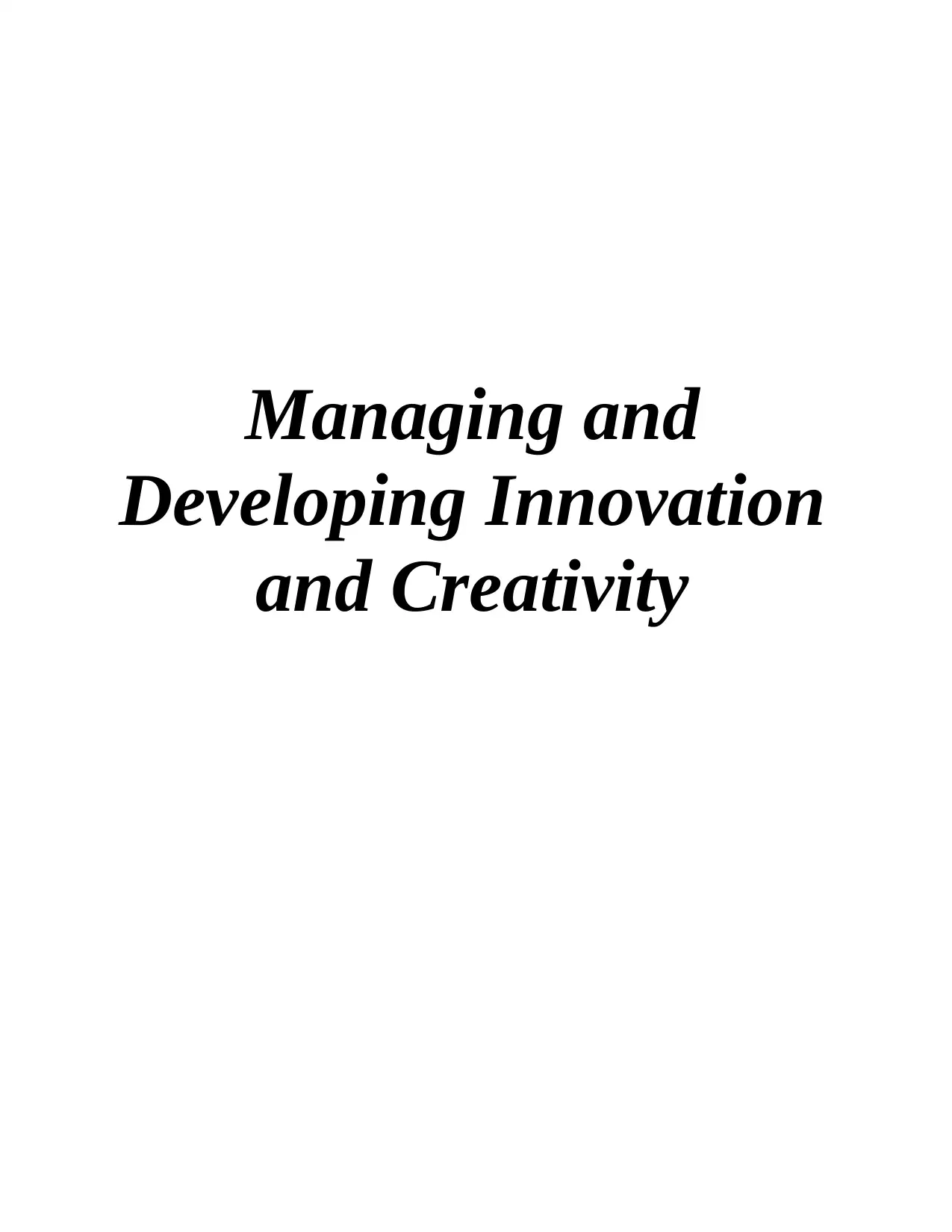
Managing and
Developing Innovation
and Creativity
Developing Innovation
and Creativity
Secure Best Marks with AI Grader
Need help grading? Try our AI Grader for instant feedback on your assignments.
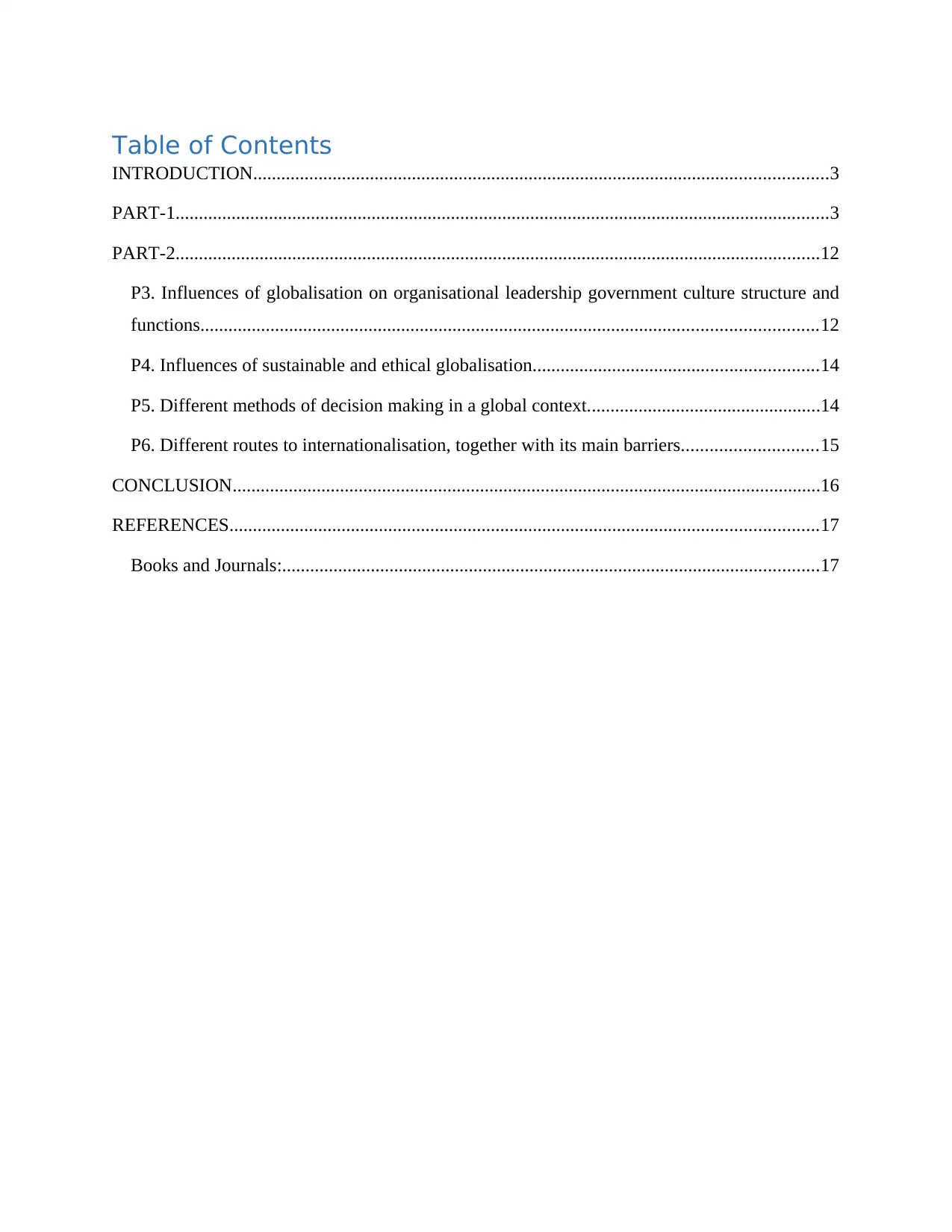
Table of Contents
INTRODUCTION...........................................................................................................................3
PART-1............................................................................................................................................3
PART-2..........................................................................................................................................12
P3. Influences of globalisation on organisational leadership government culture structure and
functions....................................................................................................................................12
P4. Influences of sustainable and ethical globalisation.............................................................14
P5. Different methods of decision making in a global context..................................................14
P6. Different routes to internationalisation, together with its main barriers.............................15
CONCLUSION..............................................................................................................................16
REFERENCES..............................................................................................................................17
Books and Journals:...................................................................................................................17
INTRODUCTION...........................................................................................................................3
PART-1............................................................................................................................................3
PART-2..........................................................................................................................................12
P3. Influences of globalisation on organisational leadership government culture structure and
functions....................................................................................................................................12
P4. Influences of sustainable and ethical globalisation.............................................................14
P5. Different methods of decision making in a global context..................................................14
P6. Different routes to internationalisation, together with its main barriers.............................15
CONCLUSION..............................................................................................................................16
REFERENCES..............................................................................................................................17
Books and Journals:...................................................................................................................17
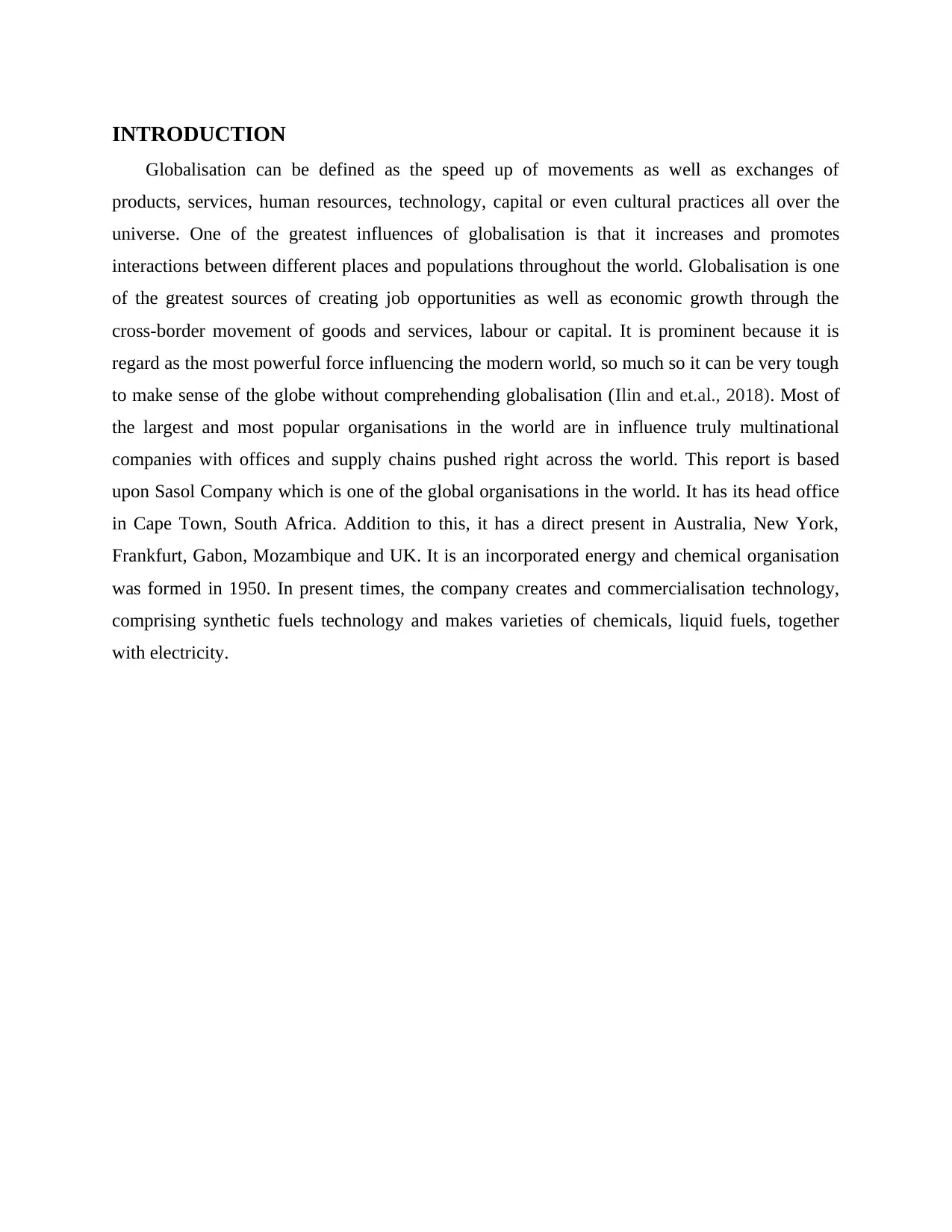
INTRODUCTION
Globalisation can be defined as the speed up of movements as well as exchanges of
products, services, human resources, technology, capital or even cultural practices all over the
universe. One of the greatest influences of globalisation is that it increases and promotes
interactions between different places and populations throughout the world. Globalisation is one
of the greatest sources of creating job opportunities as well as economic growth through the
cross-border movement of goods and services, labour or capital. It is prominent because it is
regard as the most powerful force influencing the modern world, so much so it can be very tough
to make sense of the globe without comprehending globalisation (Ilin and et.al., 2018). Most of
the largest and most popular organisations in the world are in influence truly multinational
companies with offices and supply chains pushed right across the world. This report is based
upon Sasol Company which is one of the global organisations in the world. It has its head office
in Cape Town, South Africa. Addition to this, it has a direct present in Australia, New York,
Frankfurt, Gabon, Mozambique and UK. It is an incorporated energy and chemical organisation
was formed in 1950. In present times, the company creates and commercialisation technology,
comprising synthetic fuels technology and makes varieties of chemicals, liquid fuels, together
with electricity.
Globalisation can be defined as the speed up of movements as well as exchanges of
products, services, human resources, technology, capital or even cultural practices all over the
universe. One of the greatest influences of globalisation is that it increases and promotes
interactions between different places and populations throughout the world. Globalisation is one
of the greatest sources of creating job opportunities as well as economic growth through the
cross-border movement of goods and services, labour or capital. It is prominent because it is
regard as the most powerful force influencing the modern world, so much so it can be very tough
to make sense of the globe without comprehending globalisation (Ilin and et.al., 2018). Most of
the largest and most popular organisations in the world are in influence truly multinational
companies with offices and supply chains pushed right across the world. This report is based
upon Sasol Company which is one of the global organisations in the world. It has its head office
in Cape Town, South Africa. Addition to this, it has a direct present in Australia, New York,
Frankfurt, Gabon, Mozambique and UK. It is an incorporated energy and chemical organisation
was formed in 1950. In present times, the company creates and commercialisation technology,
comprising synthetic fuels technology and makes varieties of chemicals, liquid fuels, together
with electricity.
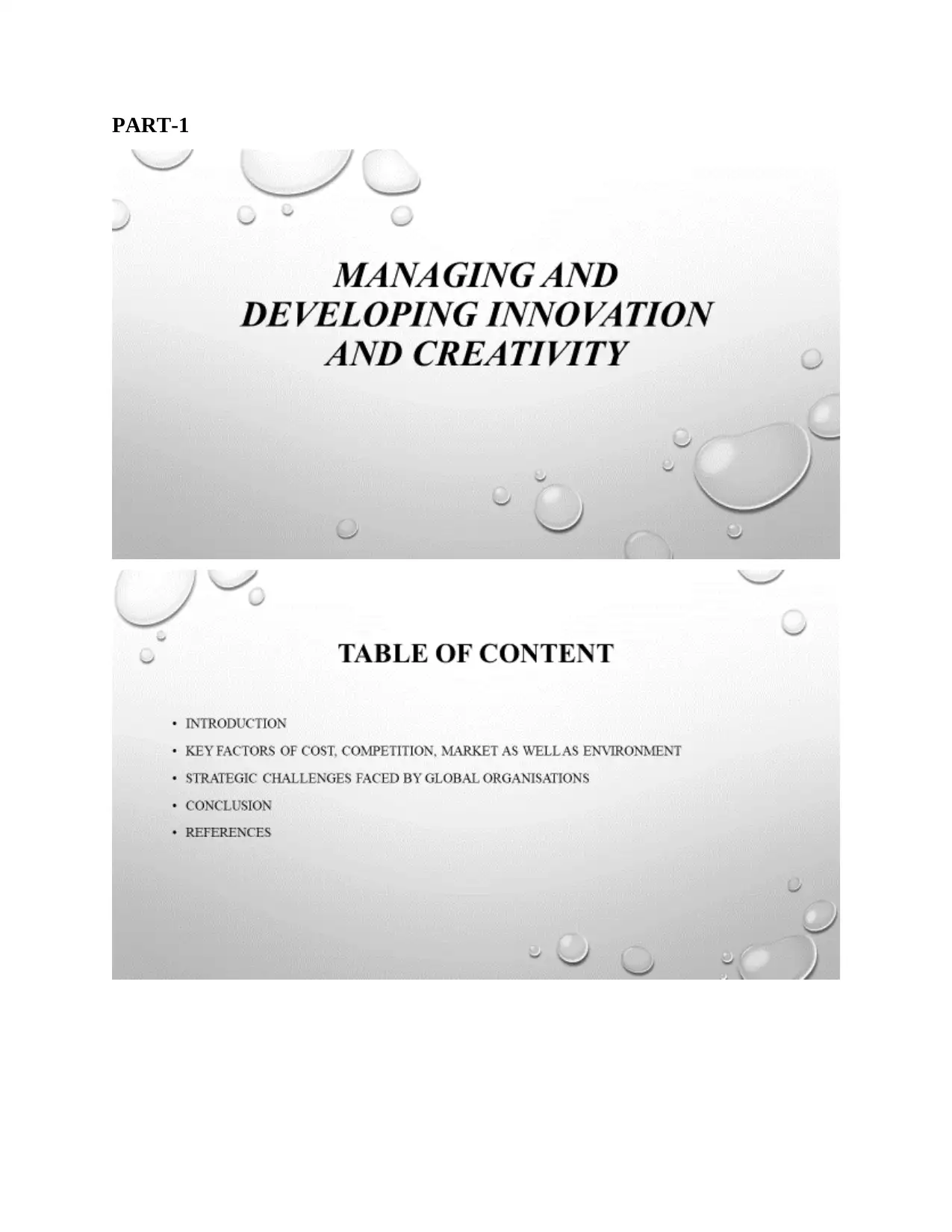
PART-1
Secure Best Marks with AI Grader
Need help grading? Try our AI Grader for instant feedback on your assignments.
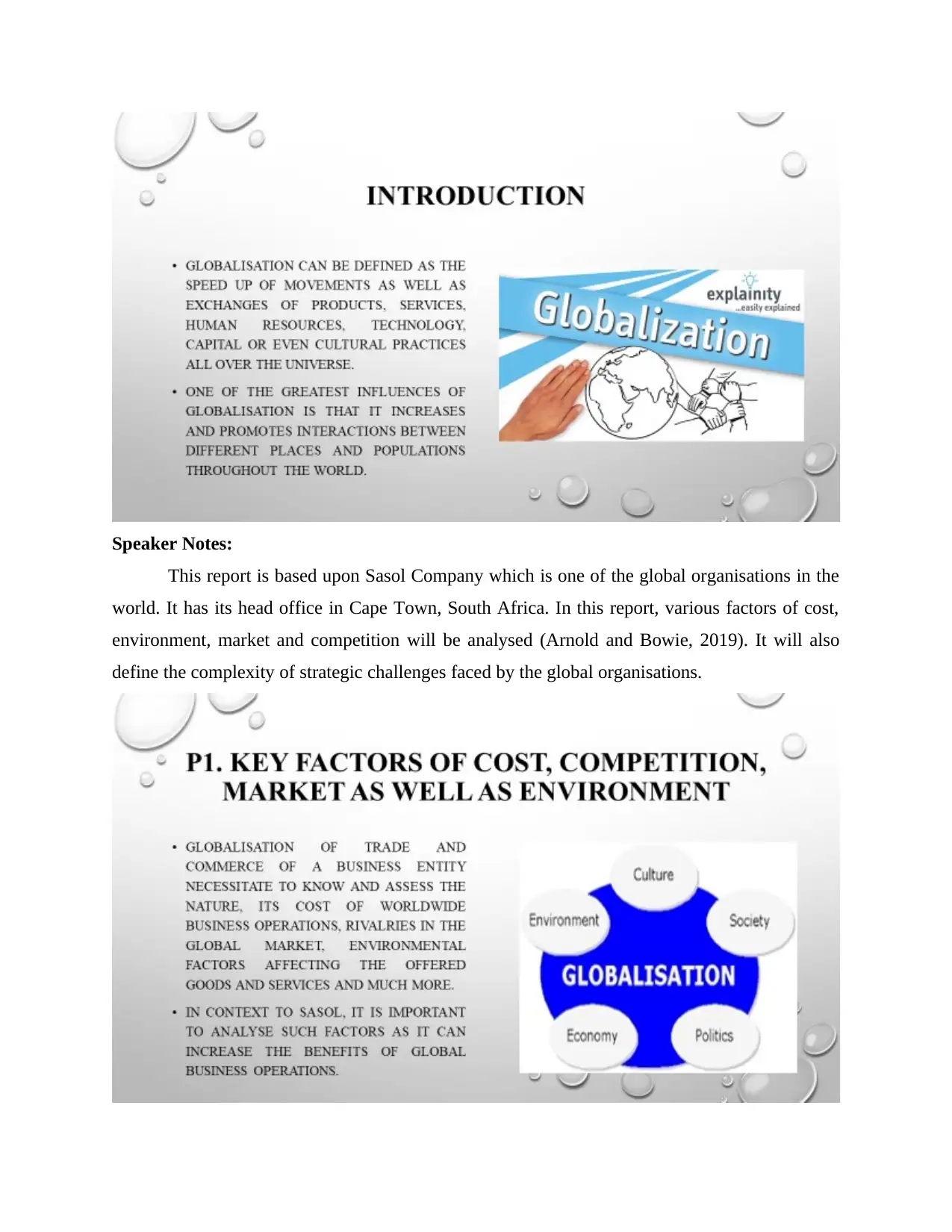
Speaker Notes:
This report is based upon Sasol Company which is one of the global organisations in the
world. It has its head office in Cape Town, South Africa. In this report, various factors of cost,
environment, market and competition will be analysed (Arnold and Bowie, 2019). It will also
define the complexity of strategic challenges faced by the global organisations.
This report is based upon Sasol Company which is one of the global organisations in the
world. It has its head office in Cape Town, South Africa. In this report, various factors of cost,
environment, market and competition will be analysed (Arnold and Bowie, 2019). It will also
define the complexity of strategic challenges faced by the global organisations.
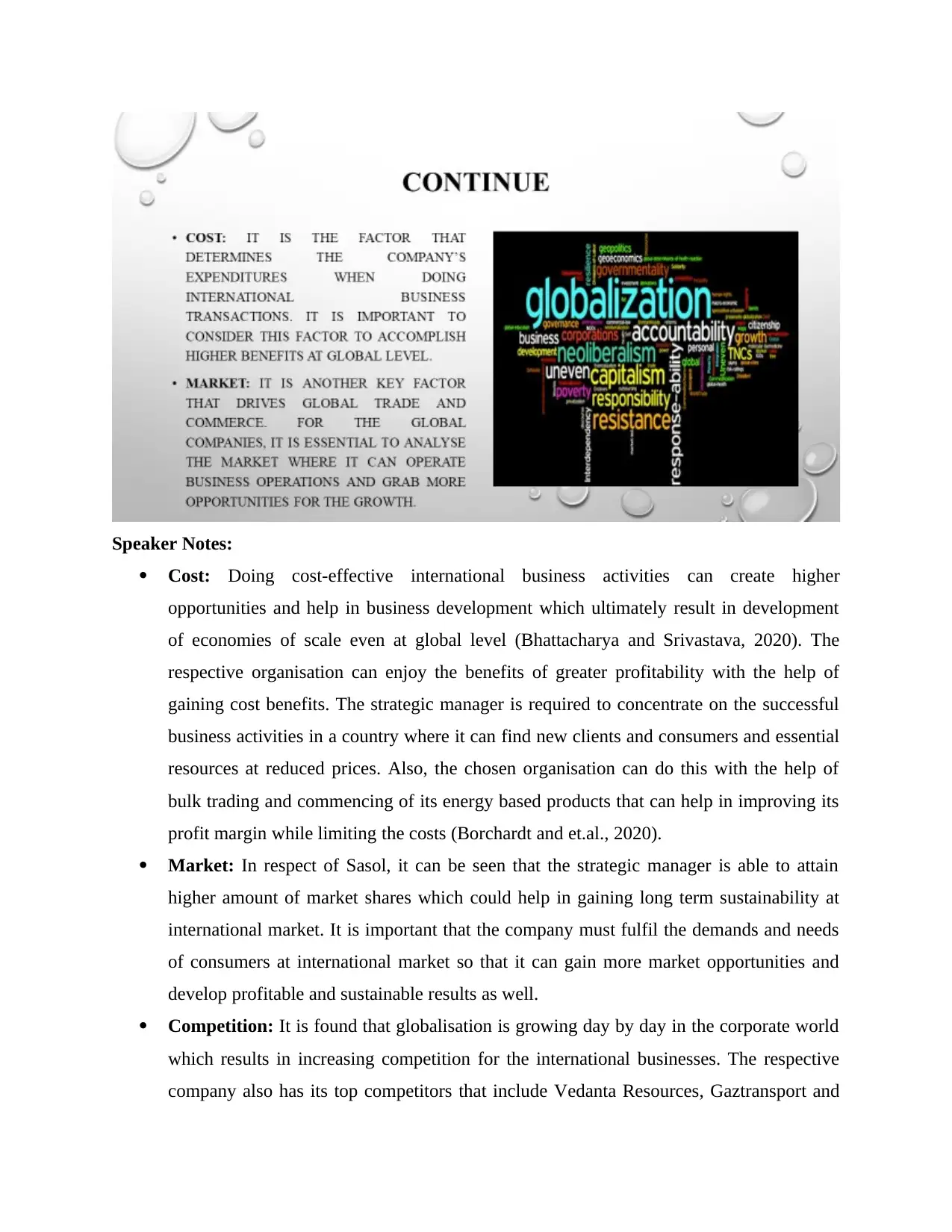
Speaker Notes:
Cost: Doing cost-effective international business activities can create higher
opportunities and help in business development which ultimately result in development
of economies of scale even at global level (Bhattacharya and Srivastava, 2020). The
respective organisation can enjoy the benefits of greater profitability with the help of
gaining cost benefits. The strategic manager is required to concentrate on the successful
business activities in a country where it can find new clients and consumers and essential
resources at reduced prices. Also, the chosen organisation can do this with the help of
bulk trading and commencing of its energy based products that can help in improving its
profit margin while limiting the costs (Borchardt and et.al., 2020).
Market: In respect of Sasol, it can be seen that the strategic manager is able to attain
higher amount of market shares which could help in gaining long term sustainability at
international market. It is important that the company must fulfil the demands and needs
of consumers at international market so that it can gain more market opportunities and
develop profitable and sustainable results as well.
Competition: It is found that globalisation is growing day by day in the corporate world
which results in increasing competition for the international businesses. The respective
company also has its top competitors that include Vedanta Resources, Gaztransport and
Cost: Doing cost-effective international business activities can create higher
opportunities and help in business development which ultimately result in development
of economies of scale even at global level (Bhattacharya and Srivastava, 2020). The
respective organisation can enjoy the benefits of greater profitability with the help of
gaining cost benefits. The strategic manager is required to concentrate on the successful
business activities in a country where it can find new clients and consumers and essential
resources at reduced prices. Also, the chosen organisation can do this with the help of
bulk trading and commencing of its energy based products that can help in improving its
profit margin while limiting the costs (Borchardt and et.al., 2020).
Market: In respect of Sasol, it can be seen that the strategic manager is able to attain
higher amount of market shares which could help in gaining long term sustainability at
international market. It is important that the company must fulfil the demands and needs
of consumers at international market so that it can gain more market opportunities and
develop profitable and sustainable results as well.
Competition: It is found that globalisation is growing day by day in the corporate world
which results in increasing competition for the international businesses. The respective
company also has its top competitors that include Vedanta Resources, Gaztransport and
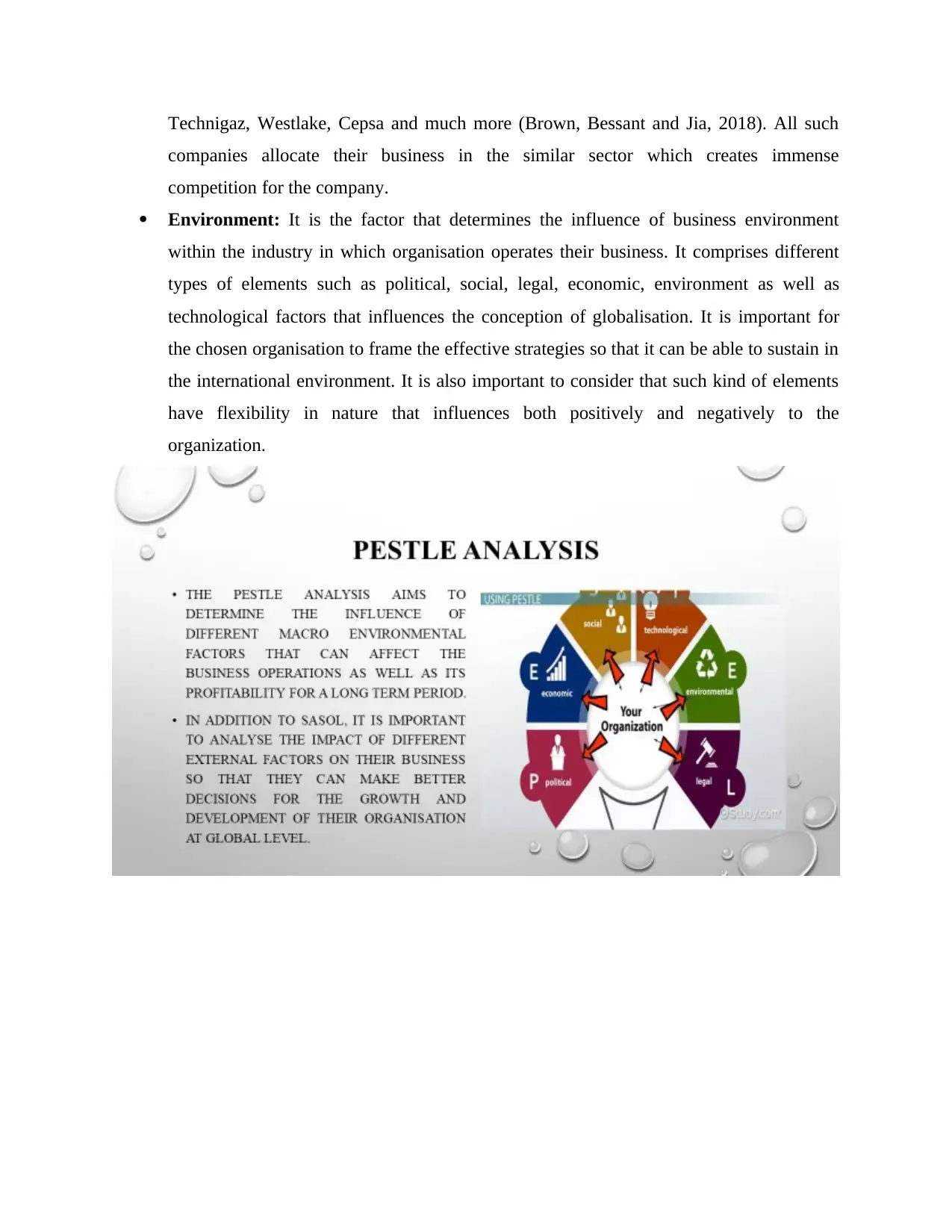
Technigaz, Westlake, Cepsa and much more (Brown, Bessant and Jia, 2018). All such
companies allocate their business in the similar sector which creates immense
competition for the company.
Environment: It is the factor that determines the influence of business environment
within the industry in which organisation operates their business. It comprises different
types of elements such as political, social, legal, economic, environment as well as
technological factors that influences the conception of globalisation. It is important for
the chosen organisation to frame the effective strategies so that it can be able to sustain in
the international environment. It is also important to consider that such kind of elements
have flexibility in nature that influences both positively and negatively to the
organization.
companies allocate their business in the similar sector which creates immense
competition for the company.
Environment: It is the factor that determines the influence of business environment
within the industry in which organisation operates their business. It comprises different
types of elements such as political, social, legal, economic, environment as well as
technological factors that influences the conception of globalisation. It is important for
the chosen organisation to frame the effective strategies so that it can be able to sustain in
the international environment. It is also important to consider that such kind of elements
have flexibility in nature that influences both positively and negatively to the
organization.
Paraphrase This Document
Need a fresh take? Get an instant paraphrase of this document with our AI Paraphraser
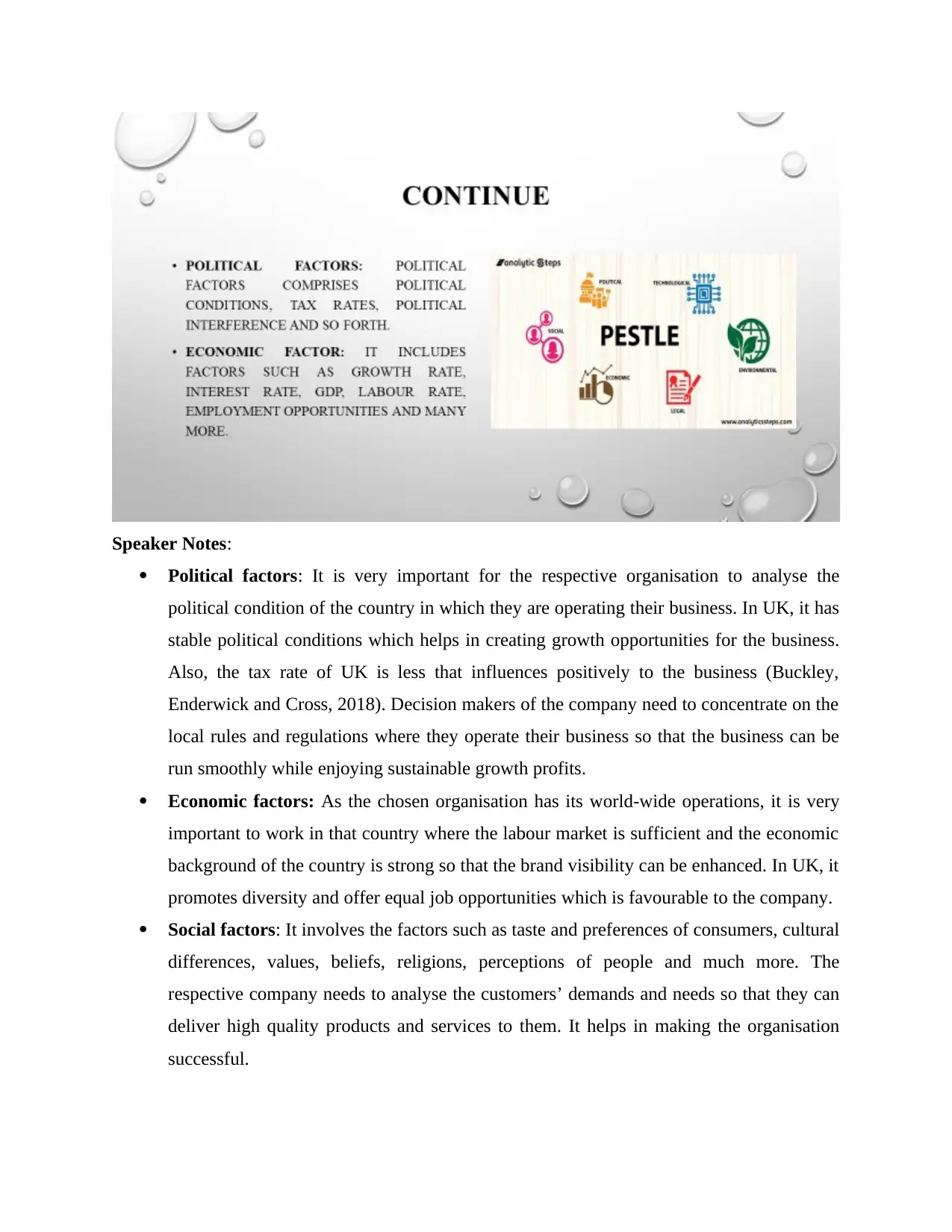
Speaker Notes:
Political factors: It is very important for the respective organisation to analyse the
political condition of the country in which they are operating their business. In UK, it has
stable political conditions which helps in creating growth opportunities for the business.
Also, the tax rate of UK is less that influences positively to the business (Buckley,
Enderwick and Cross, 2018). Decision makers of the company need to concentrate on the
local rules and regulations where they operate their business so that the business can be
run smoothly while enjoying sustainable growth profits.
Economic factors: As the chosen organisation has its world-wide operations, it is very
important to work in that country where the labour market is sufficient and the economic
background of the country is strong so that the brand visibility can be enhanced. In UK, it
promotes diversity and offer equal job opportunities which is favourable to the company.
Social factors: It involves the factors such as taste and preferences of consumers, cultural
differences, values, beliefs, religions, perceptions of people and much more. The
respective company needs to analyse the customers’ demands and needs so that they can
deliver high quality products and services to them. It helps in making the organisation
successful.
Political factors: It is very important for the respective organisation to analyse the
political condition of the country in which they are operating their business. In UK, it has
stable political conditions which helps in creating growth opportunities for the business.
Also, the tax rate of UK is less that influences positively to the business (Buckley,
Enderwick and Cross, 2018). Decision makers of the company need to concentrate on the
local rules and regulations where they operate their business so that the business can be
run smoothly while enjoying sustainable growth profits.
Economic factors: As the chosen organisation has its world-wide operations, it is very
important to work in that country where the labour market is sufficient and the economic
background of the country is strong so that the brand visibility can be enhanced. In UK, it
promotes diversity and offer equal job opportunities which is favourable to the company.
Social factors: It involves the factors such as taste and preferences of consumers, cultural
differences, values, beliefs, religions, perceptions of people and much more. The
respective company needs to analyse the customers’ demands and needs so that they can
deliver high quality products and services to them. It helps in making the organisation
successful.
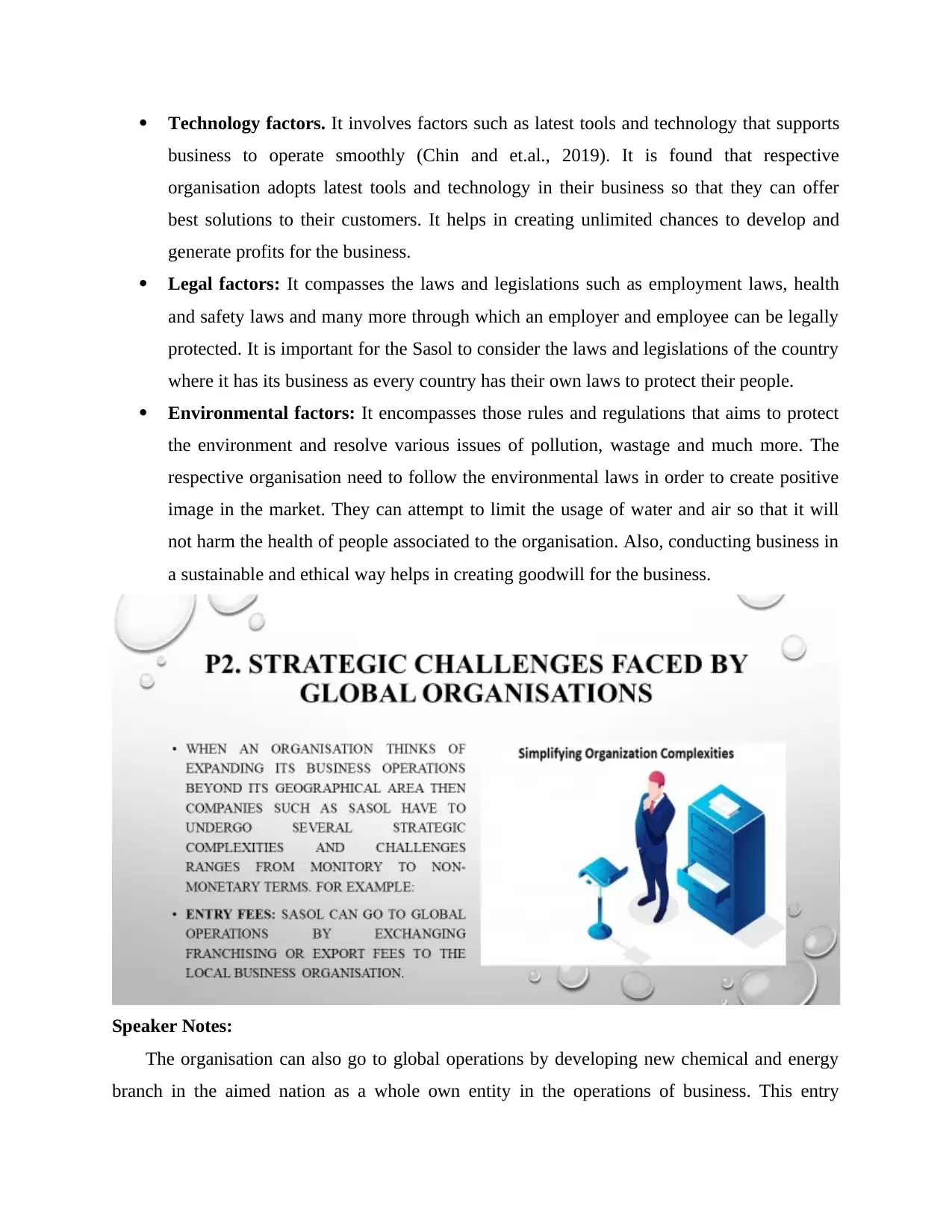
Technology factors. It involves factors such as latest tools and technology that supports
business to operate smoothly (Chin and et.al., 2019). It is found that respective
organisation adopts latest tools and technology in their business so that they can offer
best solutions to their customers. It helps in creating unlimited chances to develop and
generate profits for the business.
Legal factors: It compasses the laws and legislations such as employment laws, health
and safety laws and many more through which an employer and employee can be legally
protected. It is important for the Sasol to consider the laws and legislations of the country
where it has its business as every country has their own laws to protect their people.
Environmental factors: It encompasses those rules and regulations that aims to protect
the environment and resolve various issues of pollution, wastage and much more. The
respective organisation need to follow the environmental laws in order to create positive
image in the market. They can attempt to limit the usage of water and air so that it will
not harm the health of people associated to the organisation. Also, conducting business in
a sustainable and ethical way helps in creating goodwill for the business.
Speaker Notes:
The organisation can also go to global operations by developing new chemical and energy
branch in the aimed nation as a whole own entity in the operations of business. This entry
business to operate smoothly (Chin and et.al., 2019). It is found that respective
organisation adopts latest tools and technology in their business so that they can offer
best solutions to their customers. It helps in creating unlimited chances to develop and
generate profits for the business.
Legal factors: It compasses the laws and legislations such as employment laws, health
and safety laws and many more through which an employer and employee can be legally
protected. It is important for the Sasol to consider the laws and legislations of the country
where it has its business as every country has their own laws to protect their people.
Environmental factors: It encompasses those rules and regulations that aims to protect
the environment and resolve various issues of pollution, wastage and much more. The
respective organisation need to follow the environmental laws in order to create positive
image in the market. They can attempt to limit the usage of water and air so that it will
not harm the health of people associated to the organisation. Also, conducting business in
a sustainable and ethical way helps in creating goodwill for the business.
Speaker Notes:
The organisation can also go to global operations by developing new chemical and energy
branch in the aimed nation as a whole own entity in the operations of business. This entry
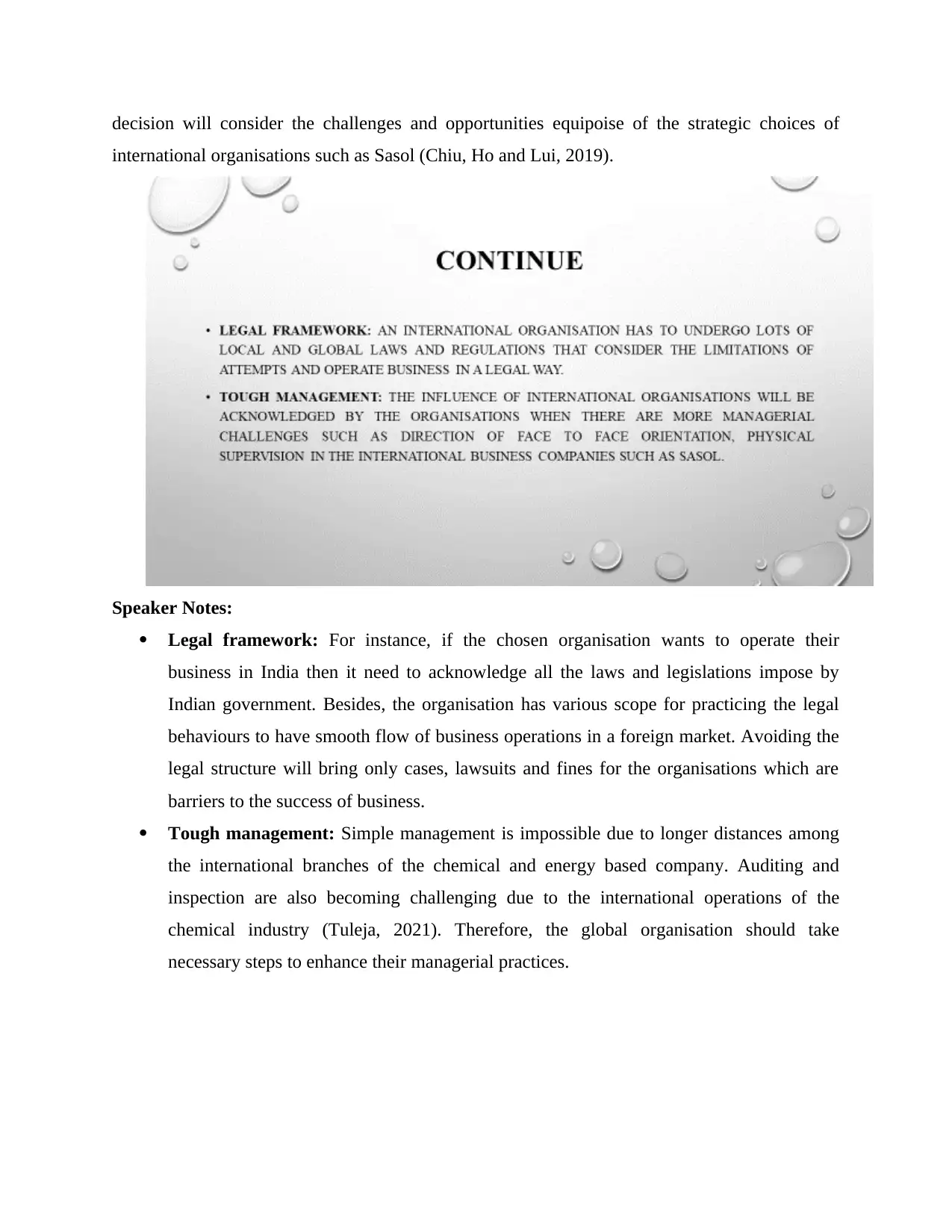
decision will consider the challenges and opportunities equipoise of the strategic choices of
international organisations such as Sasol (Chiu, Ho and Lui, 2019).
Speaker Notes:
Legal framework: For instance, if the chosen organisation wants to operate their
business in India then it need to acknowledge all the laws and legislations impose by
Indian government. Besides, the organisation has various scope for practicing the legal
behaviours to have smooth flow of business operations in a foreign market. Avoiding the
legal structure will bring only cases, lawsuits and fines for the organisations which are
barriers to the success of business.
Tough management: Simple management is impossible due to longer distances among
the international branches of the chemical and energy based company. Auditing and
inspection are also becoming challenging due to the international operations of the
chemical industry (Tuleja, 2021). Therefore, the global organisation should take
necessary steps to enhance their managerial practices.
international organisations such as Sasol (Chiu, Ho and Lui, 2019).
Speaker Notes:
Legal framework: For instance, if the chosen organisation wants to operate their
business in India then it need to acknowledge all the laws and legislations impose by
Indian government. Besides, the organisation has various scope for practicing the legal
behaviours to have smooth flow of business operations in a foreign market. Avoiding the
legal structure will bring only cases, lawsuits and fines for the organisations which are
barriers to the success of business.
Tough management: Simple management is impossible due to longer distances among
the international branches of the chemical and energy based company. Auditing and
inspection are also becoming challenging due to the international operations of the
chemical industry (Tuleja, 2021). Therefore, the global organisation should take
necessary steps to enhance their managerial practices.
Secure Best Marks with AI Grader
Need help grading? Try our AI Grader for instant feedback on your assignments.
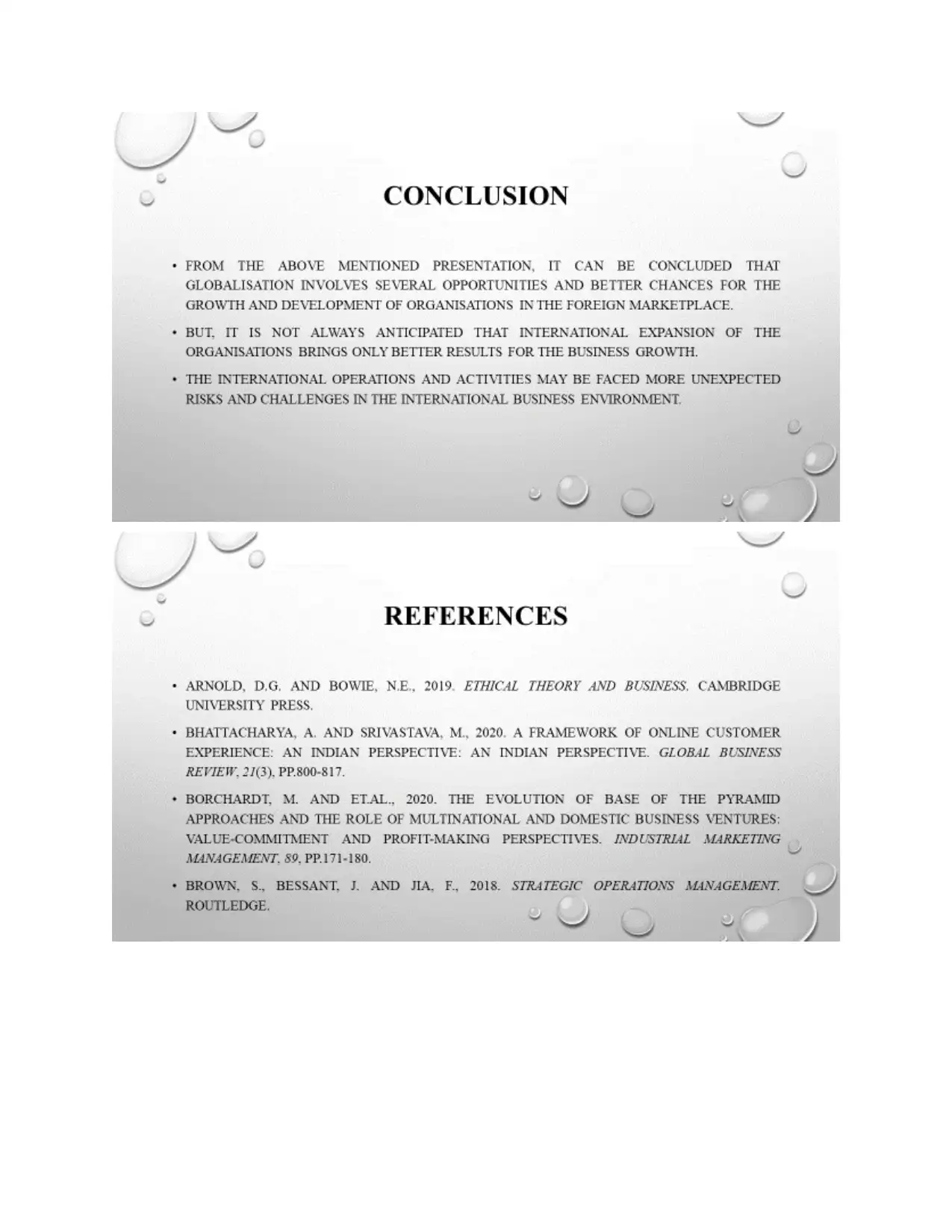
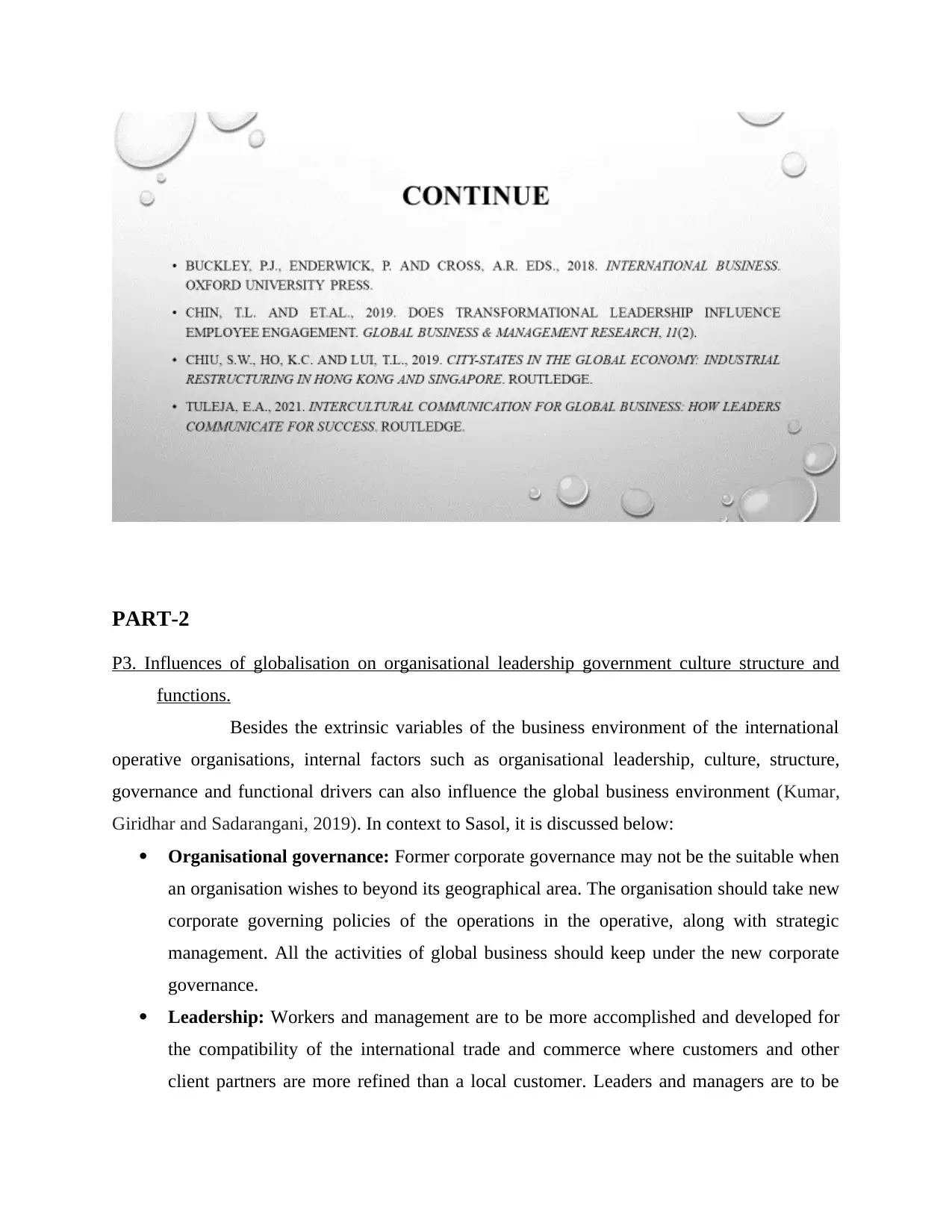
PART-2
P3. Influences of globalisation on organisational leadership government culture structure and
functions.
Besides the extrinsic variables of the business environment of the international
operative organisations, internal factors such as organisational leadership, culture, structure,
governance and functional drivers can also influence the global business environment (Kumar,
Giridhar and Sadarangani, 2019). In context to Sasol, it is discussed below:
Organisational governance: Former corporate governance may not be the suitable when
an organisation wishes to beyond its geographical area. The organisation should take new
corporate governing policies of the operations in the operative, along with strategic
management. All the activities of global business should keep under the new corporate
governance.
Leadership: Workers and management are to be more accomplished and developed for
the compatibility of the international trade and commerce where customers and other
client partners are more refined than a local customer. Leaders and managers are to be
P3. Influences of globalisation on organisational leadership government culture structure and
functions.
Besides the extrinsic variables of the business environment of the international
operative organisations, internal factors such as organisational leadership, culture, structure,
governance and functional drivers can also influence the global business environment (Kumar,
Giridhar and Sadarangani, 2019). In context to Sasol, it is discussed below:
Organisational governance: Former corporate governance may not be the suitable when
an organisation wishes to beyond its geographical area. The organisation should take new
corporate governing policies of the operations in the operative, along with strategic
management. All the activities of global business should keep under the new corporate
governance.
Leadership: Workers and management are to be more accomplished and developed for
the compatibility of the international trade and commerce where customers and other
client partners are more refined than a local customer. Leaders and managers are to be
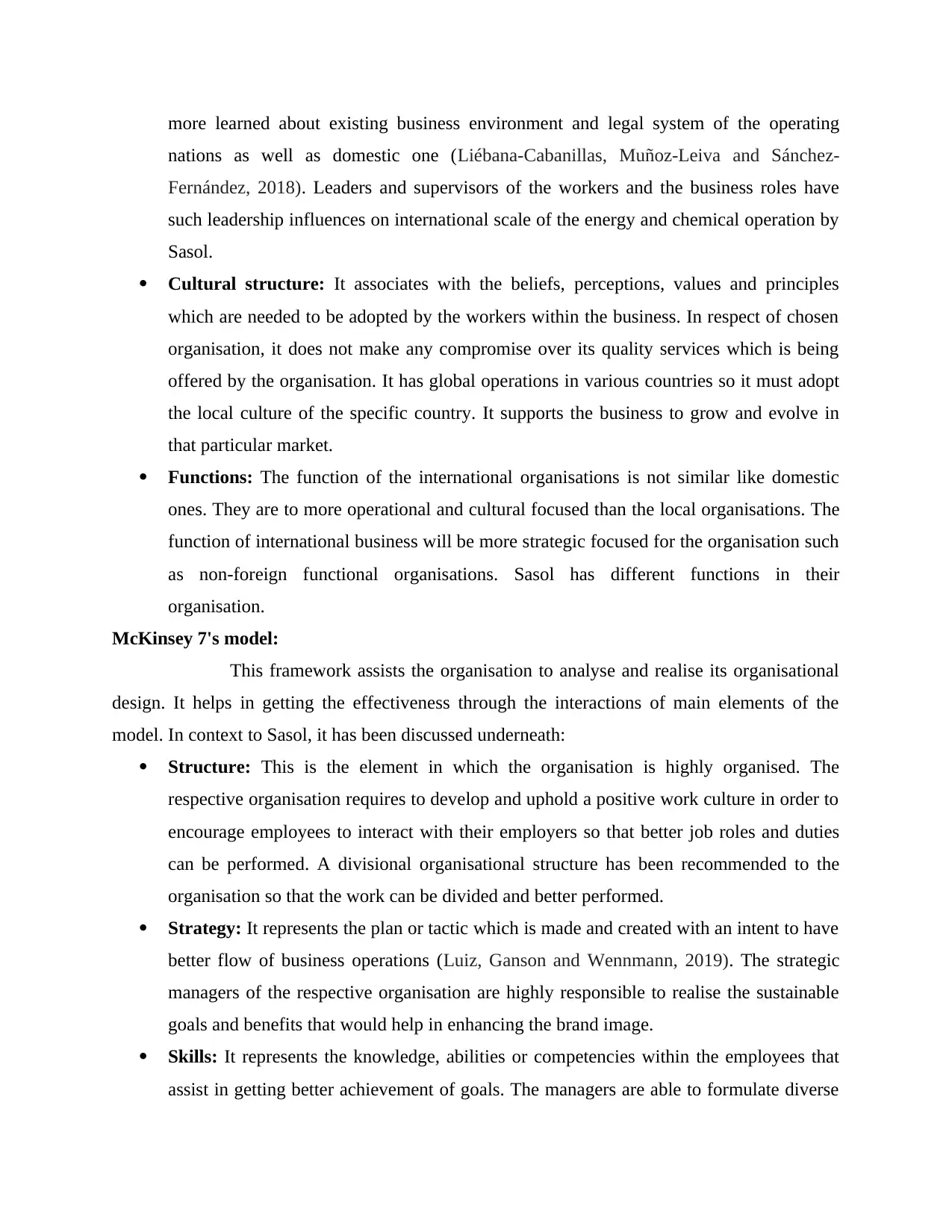
more learned about existing business environment and legal system of the operating
nations as well as domestic one (Liébana-Cabanillas, Muñoz-Leiva and Sánchez-
Fernández, 2018). Leaders and supervisors of the workers and the business roles have
such leadership influences on international scale of the energy and chemical operation by
Sasol.
Cultural structure: It associates with the beliefs, perceptions, values and principles
which are needed to be adopted by the workers within the business. In respect of chosen
organisation, it does not make any compromise over its quality services which is being
offered by the organisation. It has global operations in various countries so it must adopt
the local culture of the specific country. It supports the business to grow and evolve in
that particular market.
Functions: The function of the international organisations is not similar like domestic
ones. They are to more operational and cultural focused than the local organisations. The
function of international business will be more strategic focused for the organisation such
as non-foreign functional organisations. Sasol has different functions in their
organisation.
McKinsey 7's model:
This framework assists the organisation to analyse and realise its organisational
design. It helps in getting the effectiveness through the interactions of main elements of the
model. In context to Sasol, it has been discussed underneath:
Structure: This is the element in which the organisation is highly organised. The
respective organisation requires to develop and uphold a positive work culture in order to
encourage employees to interact with their employers so that better job roles and duties
can be performed. A divisional organisational structure has been recommended to the
organisation so that the work can be divided and better performed.
Strategy: It represents the plan or tactic which is made and created with an intent to have
better flow of business operations (Luiz, Ganson and Wennmann, 2019). The strategic
managers of the respective organisation are highly responsible to realise the sustainable
goals and benefits that would help in enhancing the brand image.
Skills: It represents the knowledge, abilities or competencies within the employees that
assist in getting better achievement of goals. The managers are able to formulate diverse
nations as well as domestic one (Liébana-Cabanillas, Muñoz-Leiva and Sánchez-
Fernández, 2018). Leaders and supervisors of the workers and the business roles have
such leadership influences on international scale of the energy and chemical operation by
Sasol.
Cultural structure: It associates with the beliefs, perceptions, values and principles
which are needed to be adopted by the workers within the business. In respect of chosen
organisation, it does not make any compromise over its quality services which is being
offered by the organisation. It has global operations in various countries so it must adopt
the local culture of the specific country. It supports the business to grow and evolve in
that particular market.
Functions: The function of the international organisations is not similar like domestic
ones. They are to more operational and cultural focused than the local organisations. The
function of international business will be more strategic focused for the organisation such
as non-foreign functional organisations. Sasol has different functions in their
organisation.
McKinsey 7's model:
This framework assists the organisation to analyse and realise its organisational
design. It helps in getting the effectiveness through the interactions of main elements of the
model. In context to Sasol, it has been discussed underneath:
Structure: This is the element in which the organisation is highly organised. The
respective organisation requires to develop and uphold a positive work culture in order to
encourage employees to interact with their employers so that better job roles and duties
can be performed. A divisional organisational structure has been recommended to the
organisation so that the work can be divided and better performed.
Strategy: It represents the plan or tactic which is made and created with an intent to have
better flow of business operations (Luiz, Ganson and Wennmann, 2019). The strategic
managers of the respective organisation are highly responsible to realise the sustainable
goals and benefits that would help in enhancing the brand image.
Skills: It represents the knowledge, abilities or competencies within the employees that
assist in getting better achievement of goals. The managers are able to formulate diverse
Paraphrase This Document
Need a fresh take? Get an instant paraphrase of this document with our AI Paraphraser
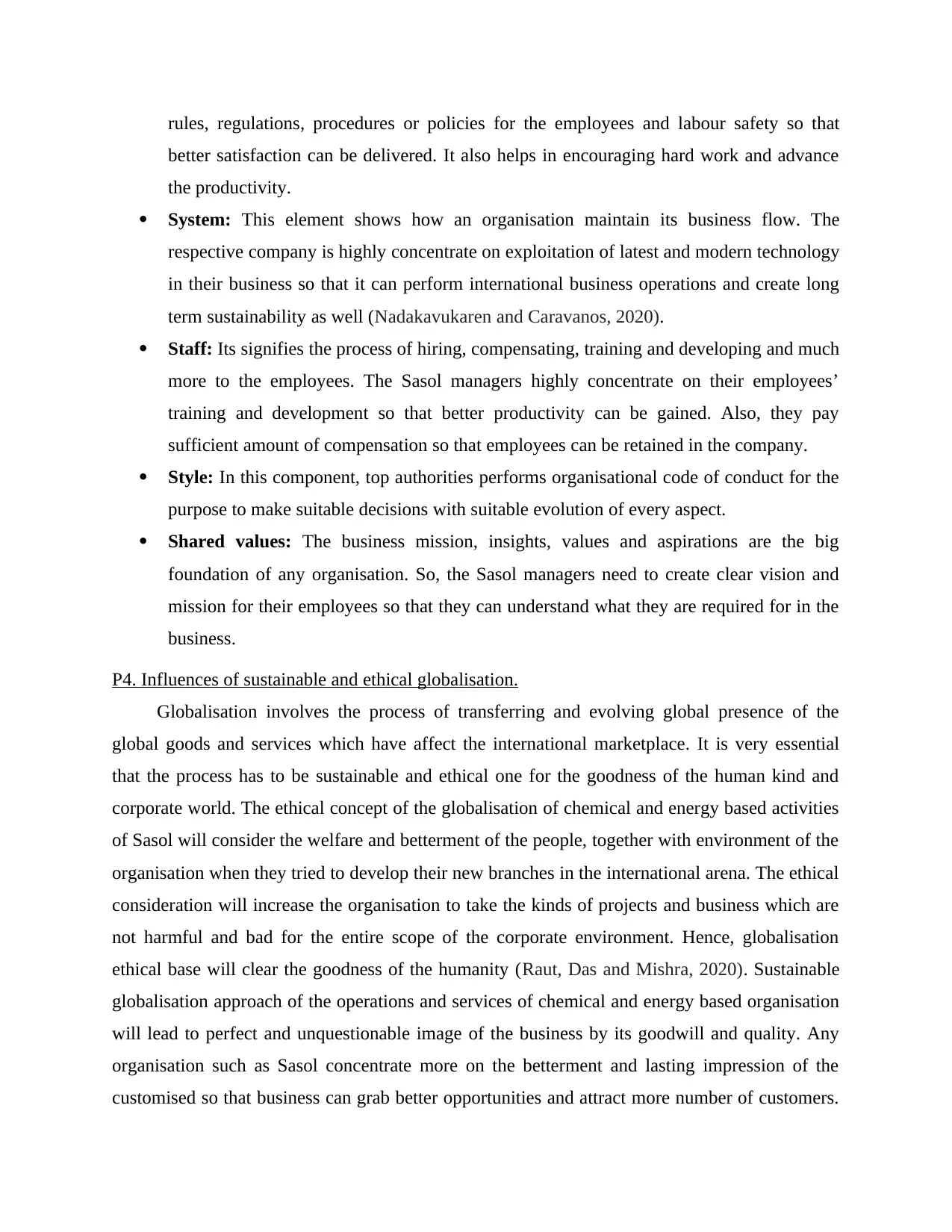
rules, regulations, procedures or policies for the employees and labour safety so that
better satisfaction can be delivered. It also helps in encouraging hard work and advance
the productivity.
System: This element shows how an organisation maintain its business flow. The
respective company is highly concentrate on exploitation of latest and modern technology
in their business so that it can perform international business operations and create long
term sustainability as well (Nadakavukaren and Caravanos, 2020).
Staff: Its signifies the process of hiring, compensating, training and developing and much
more to the employees. The Sasol managers highly concentrate on their employees’
training and development so that better productivity can be gained. Also, they pay
sufficient amount of compensation so that employees can be retained in the company.
Style: In this component, top authorities performs organisational code of conduct for the
purpose to make suitable decisions with suitable evolution of every aspect.
Shared values: The business mission, insights, values and aspirations are the big
foundation of any organisation. So, the Sasol managers need to create clear vision and
mission for their employees so that they can understand what they are required for in the
business.
P4. Influences of sustainable and ethical globalisation.
Globalisation involves the process of transferring and evolving global presence of the
global goods and services which have affect the international marketplace. It is very essential
that the process has to be sustainable and ethical one for the goodness of the human kind and
corporate world. The ethical concept of the globalisation of chemical and energy based activities
of Sasol will consider the welfare and betterment of the people, together with environment of the
organisation when they tried to develop their new branches in the international arena. The ethical
consideration will increase the organisation to take the kinds of projects and business which are
not harmful and bad for the entire scope of the corporate environment. Hence, globalisation
ethical base will clear the goodness of the humanity (Raut, Das and Mishra, 2020). Sustainable
globalisation approach of the operations and services of chemical and energy based organisation
will lead to perfect and unquestionable image of the business by its goodwill and quality. Any
organisation such as Sasol concentrate more on the betterment and lasting impression of the
customised so that business can grab better opportunities and attract more number of customers.
better satisfaction can be delivered. It also helps in encouraging hard work and advance
the productivity.
System: This element shows how an organisation maintain its business flow. The
respective company is highly concentrate on exploitation of latest and modern technology
in their business so that it can perform international business operations and create long
term sustainability as well (Nadakavukaren and Caravanos, 2020).
Staff: Its signifies the process of hiring, compensating, training and developing and much
more to the employees. The Sasol managers highly concentrate on their employees’
training and development so that better productivity can be gained. Also, they pay
sufficient amount of compensation so that employees can be retained in the company.
Style: In this component, top authorities performs organisational code of conduct for the
purpose to make suitable decisions with suitable evolution of every aspect.
Shared values: The business mission, insights, values and aspirations are the big
foundation of any organisation. So, the Sasol managers need to create clear vision and
mission for their employees so that they can understand what they are required for in the
business.
P4. Influences of sustainable and ethical globalisation.
Globalisation involves the process of transferring and evolving global presence of the
global goods and services which have affect the international marketplace. It is very essential
that the process has to be sustainable and ethical one for the goodness of the human kind and
corporate world. The ethical concept of the globalisation of chemical and energy based activities
of Sasol will consider the welfare and betterment of the people, together with environment of the
organisation when they tried to develop their new branches in the international arena. The ethical
consideration will increase the organisation to take the kinds of projects and business which are
not harmful and bad for the entire scope of the corporate environment. Hence, globalisation
ethical base will clear the goodness of the humanity (Raut, Das and Mishra, 2020). Sustainable
globalisation approach of the operations and services of chemical and energy based organisation
will lead to perfect and unquestionable image of the business by its goodwill and quality. Any
organisation such as Sasol concentrate more on the betterment and lasting impression of the
customised so that business can grab better opportunities and attract more number of customers.
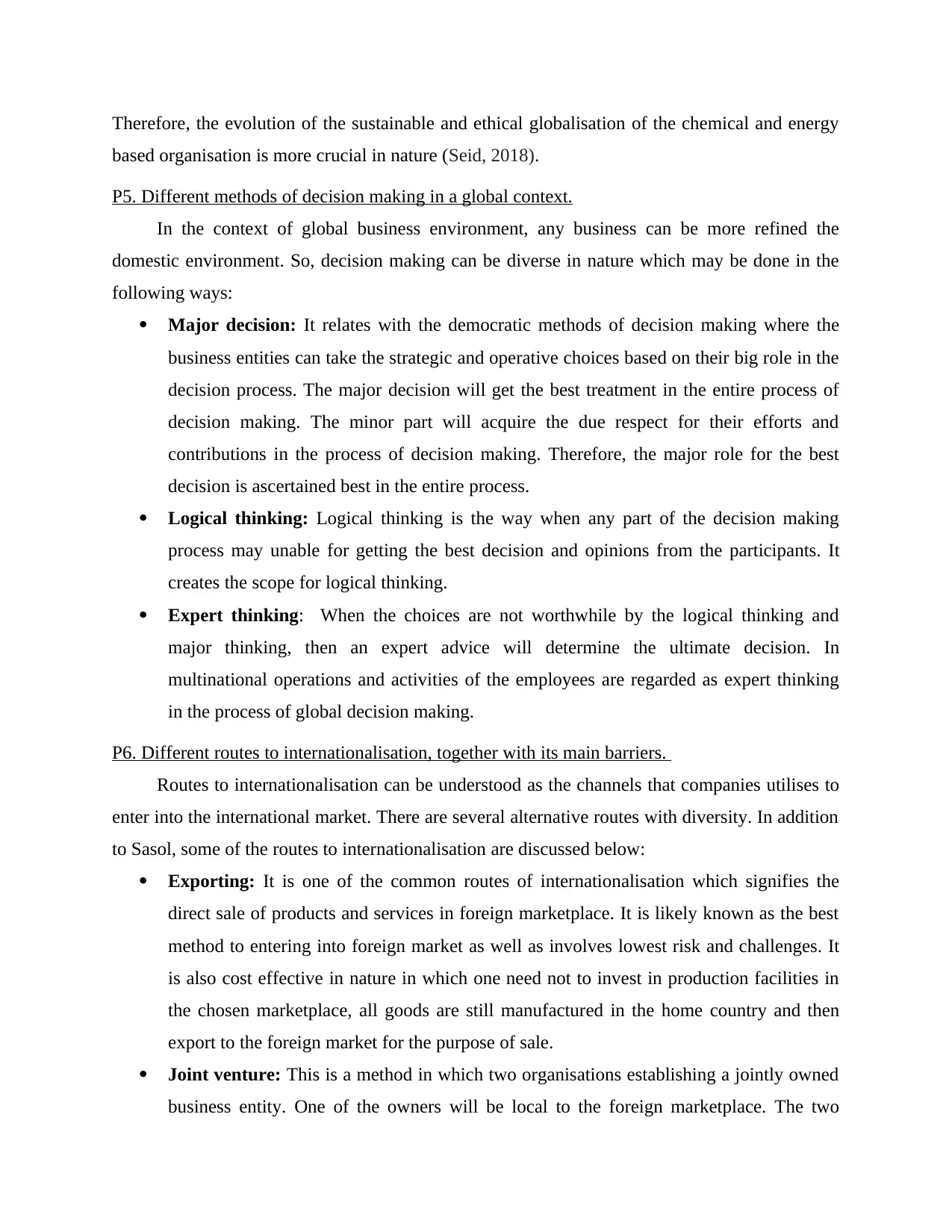
Therefore, the evolution of the sustainable and ethical globalisation of the chemical and energy
based organisation is more crucial in nature (Seid, 2018).
P5. Different methods of decision making in a global context.
In the context of global business environment, any business can be more refined the
domestic environment. So, decision making can be diverse in nature which may be done in the
following ways:
Major decision: It relates with the democratic methods of decision making where the
business entities can take the strategic and operative choices based on their big role in the
decision process. The major decision will get the best treatment in the entire process of
decision making. The minor part will acquire the due respect for their efforts and
contributions in the process of decision making. Therefore, the major role for the best
decision is ascertained best in the entire process.
Logical thinking: Logical thinking is the way when any part of the decision making
process may unable for getting the best decision and opinions from the participants. It
creates the scope for logical thinking.
Expert thinking: When the choices are not worthwhile by the logical thinking and
major thinking, then an expert advice will determine the ultimate decision. In
multinational operations and activities of the employees are regarded as expert thinking
in the process of global decision making.
P6. Different routes to internationalisation, together with its main barriers.
Routes to internationalisation can be understood as the channels that companies utilises to
enter into the international market. There are several alternative routes with diversity. In addition
to Sasol, some of the routes to internationalisation are discussed below:
Exporting: It is one of the common routes of internationalisation which signifies the
direct sale of products and services in foreign marketplace. It is likely known as the best
method to entering into foreign market as well as involves lowest risk and challenges. It
is also cost effective in nature in which one need not to invest in production facilities in
the chosen marketplace, all goods are still manufactured in the home country and then
export to the foreign market for the purpose of sale.
Joint venture: This is a method in which two organisations establishing a jointly owned
business entity. One of the owners will be local to the foreign marketplace. The two
based organisation is more crucial in nature (Seid, 2018).
P5. Different methods of decision making in a global context.
In the context of global business environment, any business can be more refined the
domestic environment. So, decision making can be diverse in nature which may be done in the
following ways:
Major decision: It relates with the democratic methods of decision making where the
business entities can take the strategic and operative choices based on their big role in the
decision process. The major decision will get the best treatment in the entire process of
decision making. The minor part will acquire the due respect for their efforts and
contributions in the process of decision making. Therefore, the major role for the best
decision is ascertained best in the entire process.
Logical thinking: Logical thinking is the way when any part of the decision making
process may unable for getting the best decision and opinions from the participants. It
creates the scope for logical thinking.
Expert thinking: When the choices are not worthwhile by the logical thinking and
major thinking, then an expert advice will determine the ultimate decision. In
multinational operations and activities of the employees are regarded as expert thinking
in the process of global decision making.
P6. Different routes to internationalisation, together with its main barriers.
Routes to internationalisation can be understood as the channels that companies utilises to
enter into the international market. There are several alternative routes with diversity. In addition
to Sasol, some of the routes to internationalisation are discussed below:
Exporting: It is one of the common routes of internationalisation which signifies the
direct sale of products and services in foreign marketplace. It is likely known as the best
method to entering into foreign market as well as involves lowest risk and challenges. It
is also cost effective in nature in which one need not to invest in production facilities in
the chosen marketplace, all goods are still manufactured in the home country and then
export to the foreign market for the purpose of sale.
Joint venture: This is a method in which two organisations establishing a jointly owned
business entity. One of the owners will be local to the foreign marketplace. The two
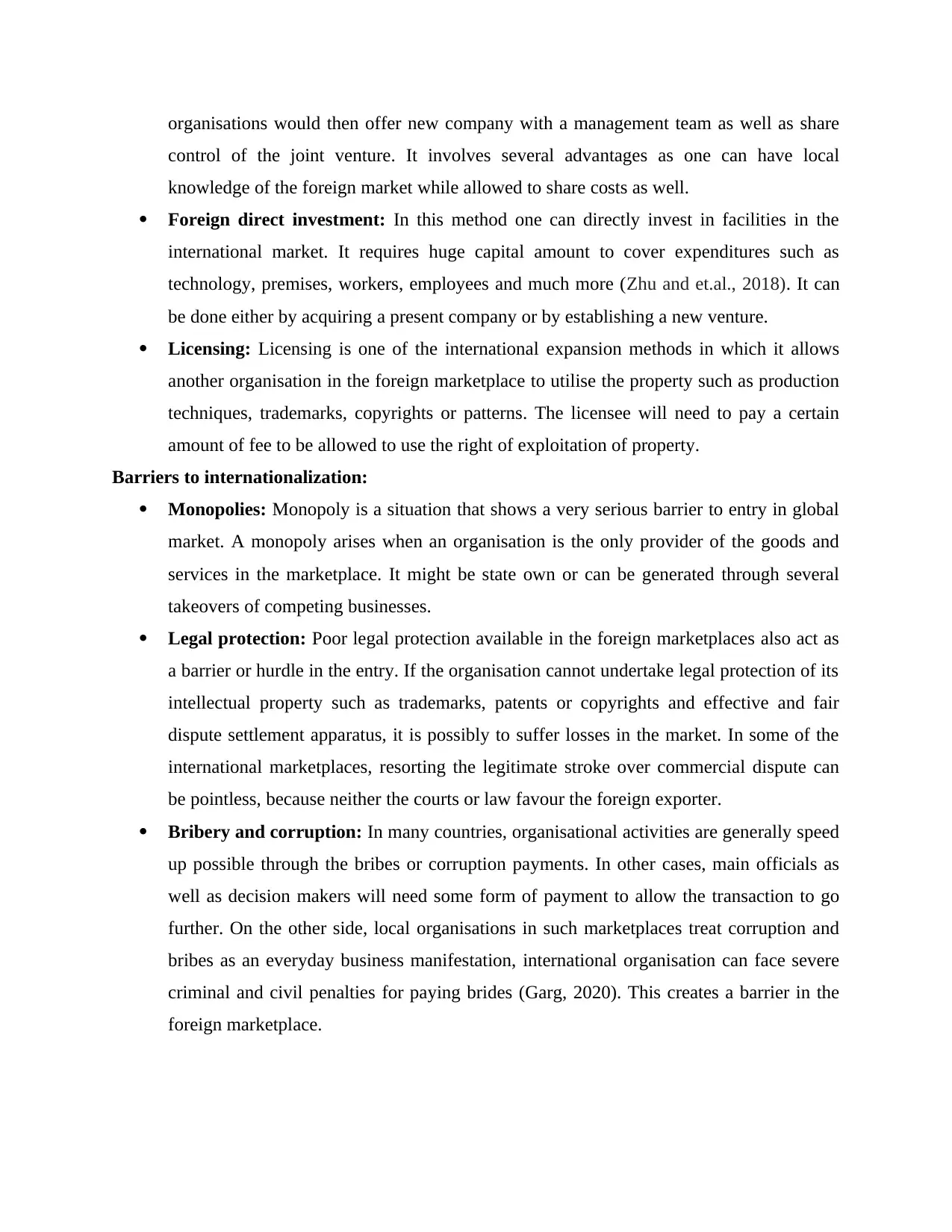
organisations would then offer new company with a management team as well as share
control of the joint venture. It involves several advantages as one can have local
knowledge of the foreign market while allowed to share costs as well.
Foreign direct investment: In this method one can directly invest in facilities in the
international market. It requires huge capital amount to cover expenditures such as
technology, premises, workers, employees and much more (Zhu and et.al., 2018). It can
be done either by acquiring a present company or by establishing a new venture.
Licensing: Licensing is one of the international expansion methods in which it allows
another organisation in the foreign marketplace to utilise the property such as production
techniques, trademarks, copyrights or patterns. The licensee will need to pay a certain
amount of fee to be allowed to use the right of exploitation of property.
Barriers to internationalization:
Monopolies: Monopoly is a situation that shows a very serious barrier to entry in global
market. A monopoly arises when an organisation is the only provider of the goods and
services in the marketplace. It might be state own or can be generated through several
takeovers of competing businesses.
Legal protection: Poor legal protection available in the foreign marketplaces also act as
a barrier or hurdle in the entry. If the organisation cannot undertake legal protection of its
intellectual property such as trademarks, patents or copyrights and effective and fair
dispute settlement apparatus, it is possibly to suffer losses in the market. In some of the
international marketplaces, resorting the legitimate stroke over commercial dispute can
be pointless, because neither the courts or law favour the foreign exporter.
Bribery and corruption: In many countries, organisational activities are generally speed
up possible through the bribes or corruption payments. In other cases, main officials as
well as decision makers will need some form of payment to allow the transaction to go
further. On the other side, local organisations in such marketplaces treat corruption and
bribes as an everyday business manifestation, international organisation can face severe
criminal and civil penalties for paying brides (Garg, 2020). This creates a barrier in the
foreign marketplace.
control of the joint venture. It involves several advantages as one can have local
knowledge of the foreign market while allowed to share costs as well.
Foreign direct investment: In this method one can directly invest in facilities in the
international market. It requires huge capital amount to cover expenditures such as
technology, premises, workers, employees and much more (Zhu and et.al., 2018). It can
be done either by acquiring a present company or by establishing a new venture.
Licensing: Licensing is one of the international expansion methods in which it allows
another organisation in the foreign marketplace to utilise the property such as production
techniques, trademarks, copyrights or patterns. The licensee will need to pay a certain
amount of fee to be allowed to use the right of exploitation of property.
Barriers to internationalization:
Monopolies: Monopoly is a situation that shows a very serious barrier to entry in global
market. A monopoly arises when an organisation is the only provider of the goods and
services in the marketplace. It might be state own or can be generated through several
takeovers of competing businesses.
Legal protection: Poor legal protection available in the foreign marketplaces also act as
a barrier or hurdle in the entry. If the organisation cannot undertake legal protection of its
intellectual property such as trademarks, patents or copyrights and effective and fair
dispute settlement apparatus, it is possibly to suffer losses in the market. In some of the
international marketplaces, resorting the legitimate stroke over commercial dispute can
be pointless, because neither the courts or law favour the foreign exporter.
Bribery and corruption: In many countries, organisational activities are generally speed
up possible through the bribes or corruption payments. In other cases, main officials as
well as decision makers will need some form of payment to allow the transaction to go
further. On the other side, local organisations in such marketplaces treat corruption and
bribes as an everyday business manifestation, international organisation can face severe
criminal and civil penalties for paying brides (Garg, 2020). This creates a barrier in the
foreign marketplace.
Secure Best Marks with AI Grader
Need help grading? Try our AI Grader for instant feedback on your assignments.
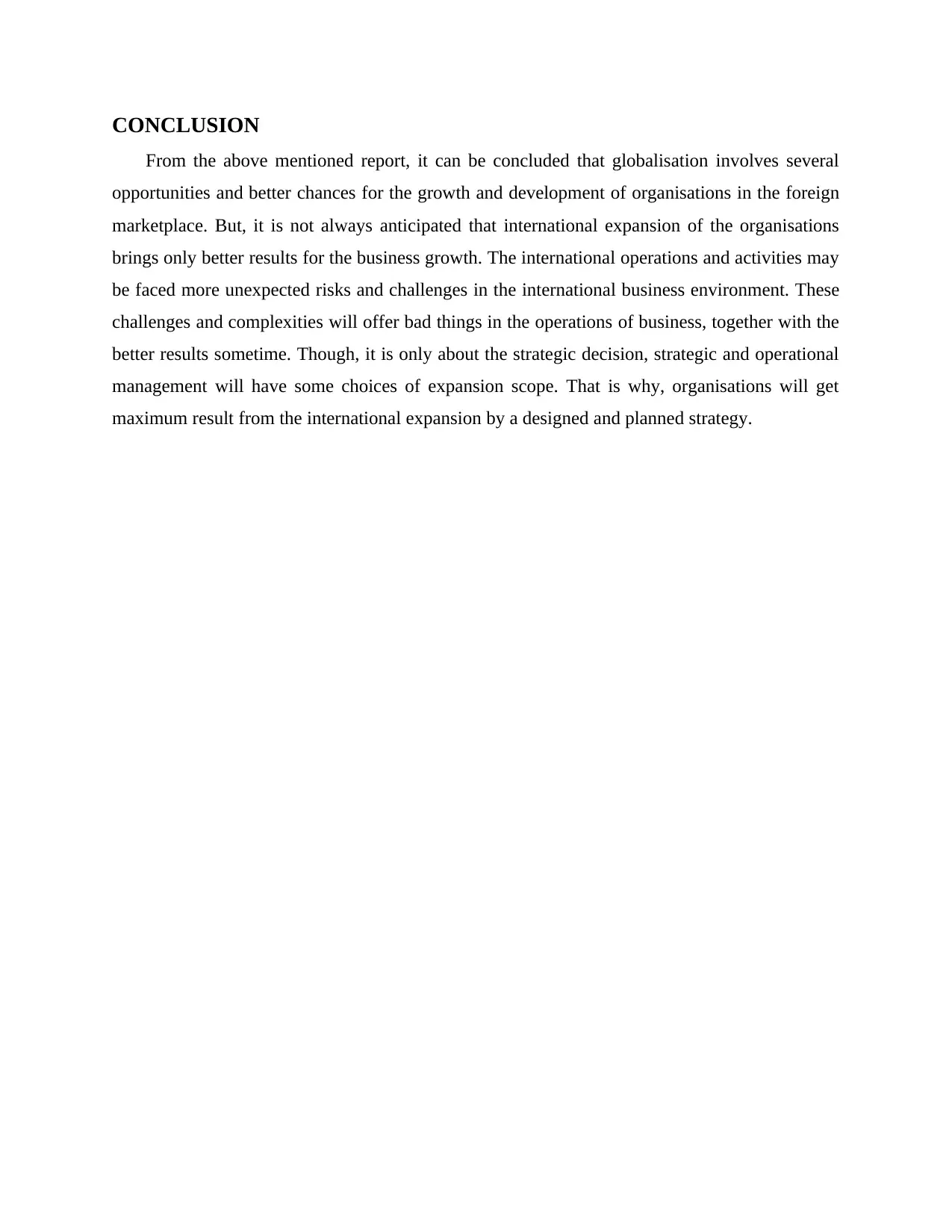
CONCLUSION
From the above mentioned report, it can be concluded that globalisation involves several
opportunities and better chances for the growth and development of organisations in the foreign
marketplace. But, it is not always anticipated that international expansion of the organisations
brings only better results for the business growth. The international operations and activities may
be faced more unexpected risks and challenges in the international business environment. These
challenges and complexities will offer bad things in the operations of business, together with the
better results sometime. Though, it is only about the strategic decision, strategic and operational
management will have some choices of expansion scope. That is why, organisations will get
maximum result from the international expansion by a designed and planned strategy.
From the above mentioned report, it can be concluded that globalisation involves several
opportunities and better chances for the growth and development of organisations in the foreign
marketplace. But, it is not always anticipated that international expansion of the organisations
brings only better results for the business growth. The international operations and activities may
be faced more unexpected risks and challenges in the international business environment. These
challenges and complexities will offer bad things in the operations of business, together with the
better results sometime. Though, it is only about the strategic decision, strategic and operational
management will have some choices of expansion scope. That is why, organisations will get
maximum result from the international expansion by a designed and planned strategy.
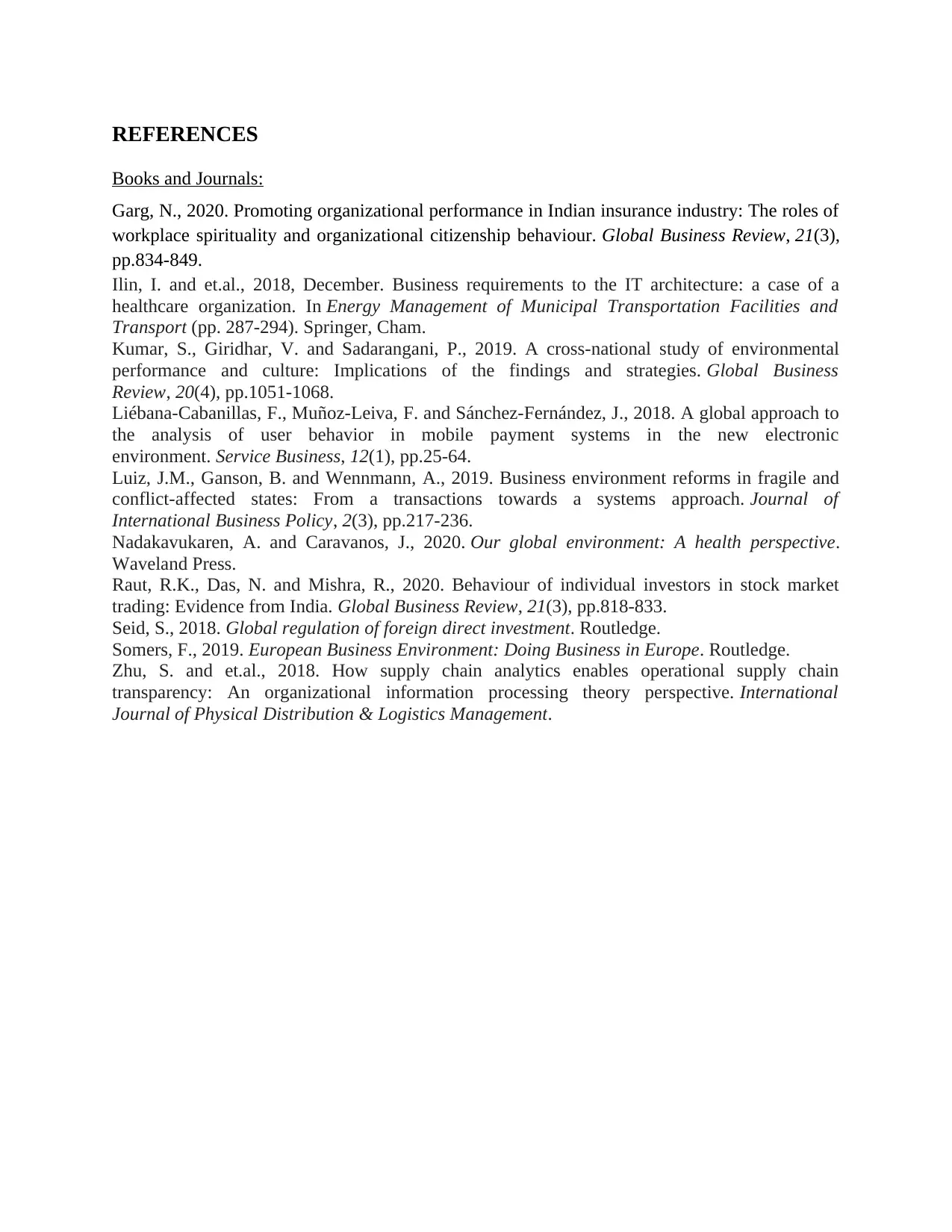
REFERENCES
Books and Journals:
Garg, N., 2020. Promoting organizational performance in Indian insurance industry: The roles of
workplace spirituality and organizational citizenship behaviour. Global Business Review, 21(3),
pp.834-849.
Ilin, I. and et.al., 2018, December. Business requirements to the IT architecture: a case of a
healthcare organization. In Energy Management of Municipal Transportation Facilities and
Transport (pp. 287-294). Springer, Cham.
Kumar, S., Giridhar, V. and Sadarangani, P., 2019. A cross-national study of environmental
performance and culture: Implications of the findings and strategies. Global Business
Review, 20(4), pp.1051-1068.
Liébana-Cabanillas, F., Muñoz-Leiva, F. and Sánchez-Fernández, J., 2018. A global approach to
the analysis of user behavior in mobile payment systems in the new electronic
environment. Service Business, 12(1), pp.25-64.
Luiz, J.M., Ganson, B. and Wennmann, A., 2019. Business environment reforms in fragile and
conflict-affected states: From a transactions towards a systems approach. Journal of
International Business Policy, 2(3), pp.217-236.
Nadakavukaren, A. and Caravanos, J., 2020. Our global environment: A health perspective.
Waveland Press.
Raut, R.K., Das, N. and Mishra, R., 2020. Behaviour of individual investors in stock market
trading: Evidence from India. Global Business Review, 21(3), pp.818-833.
Seid, S., 2018. Global regulation of foreign direct investment. Routledge.
Somers, F., 2019. European Business Environment: Doing Business in Europe. Routledge.
Zhu, S. and et.al., 2018. How supply chain analytics enables operational supply chain
transparency: An organizational information processing theory perspective. International
Journal of Physical Distribution & Logistics Management.
Books and Journals:
Garg, N., 2020. Promoting organizational performance in Indian insurance industry: The roles of
workplace spirituality and organizational citizenship behaviour. Global Business Review, 21(3),
pp.834-849.
Ilin, I. and et.al., 2018, December. Business requirements to the IT architecture: a case of a
healthcare organization. In Energy Management of Municipal Transportation Facilities and
Transport (pp. 287-294). Springer, Cham.
Kumar, S., Giridhar, V. and Sadarangani, P., 2019. A cross-national study of environmental
performance and culture: Implications of the findings and strategies. Global Business
Review, 20(4), pp.1051-1068.
Liébana-Cabanillas, F., Muñoz-Leiva, F. and Sánchez-Fernández, J., 2018. A global approach to
the analysis of user behavior in mobile payment systems in the new electronic
environment. Service Business, 12(1), pp.25-64.
Luiz, J.M., Ganson, B. and Wennmann, A., 2019. Business environment reforms in fragile and
conflict-affected states: From a transactions towards a systems approach. Journal of
International Business Policy, 2(3), pp.217-236.
Nadakavukaren, A. and Caravanos, J., 2020. Our global environment: A health perspective.
Waveland Press.
Raut, R.K., Das, N. and Mishra, R., 2020. Behaviour of individual investors in stock market
trading: Evidence from India. Global Business Review, 21(3), pp.818-833.
Seid, S., 2018. Global regulation of foreign direct investment. Routledge.
Somers, F., 2019. European Business Environment: Doing Business in Europe. Routledge.
Zhu, S. and et.al., 2018. How supply chain analytics enables operational supply chain
transparency: An organizational information processing theory perspective. International
Journal of Physical Distribution & Logistics Management.
1 out of 18
Related Documents
Your All-in-One AI-Powered Toolkit for Academic Success.
+13062052269
info@desklib.com
Available 24*7 on WhatsApp / Email
![[object Object]](/_next/static/media/star-bottom.7253800d.svg)
Unlock your academic potential
© 2024 | Zucol Services PVT LTD | All rights reserved.

